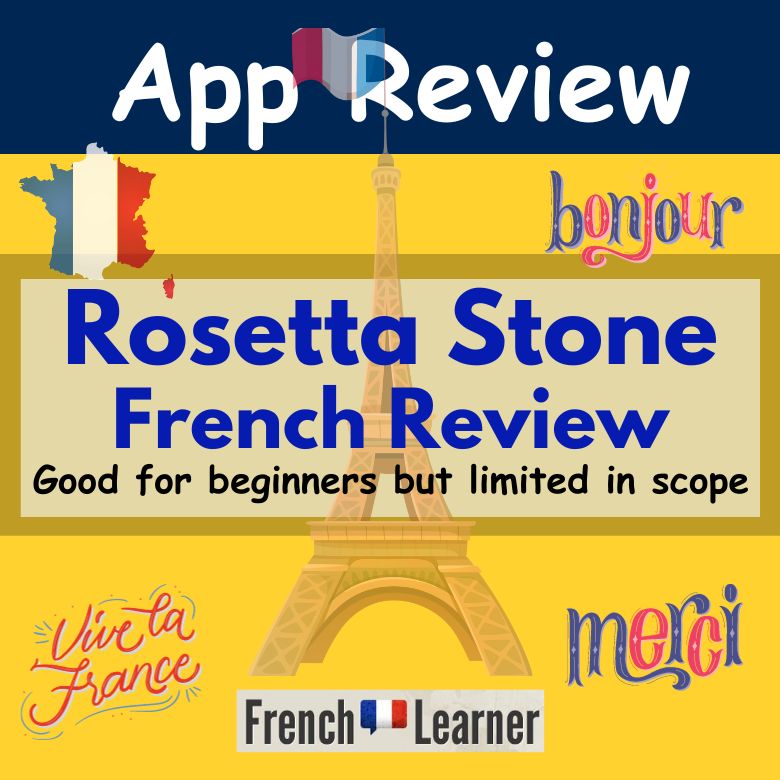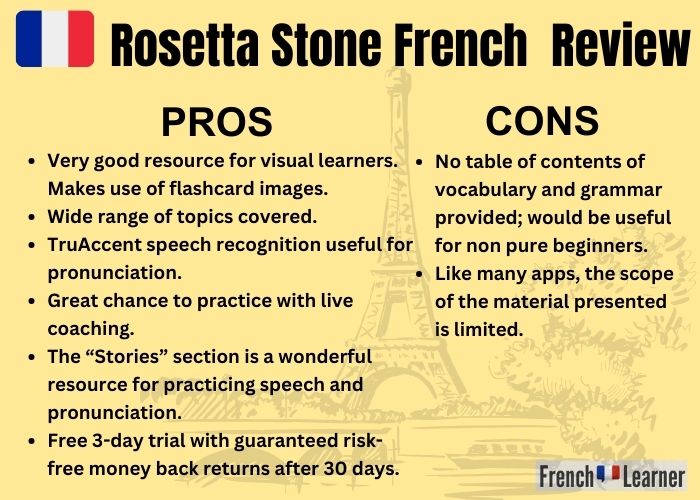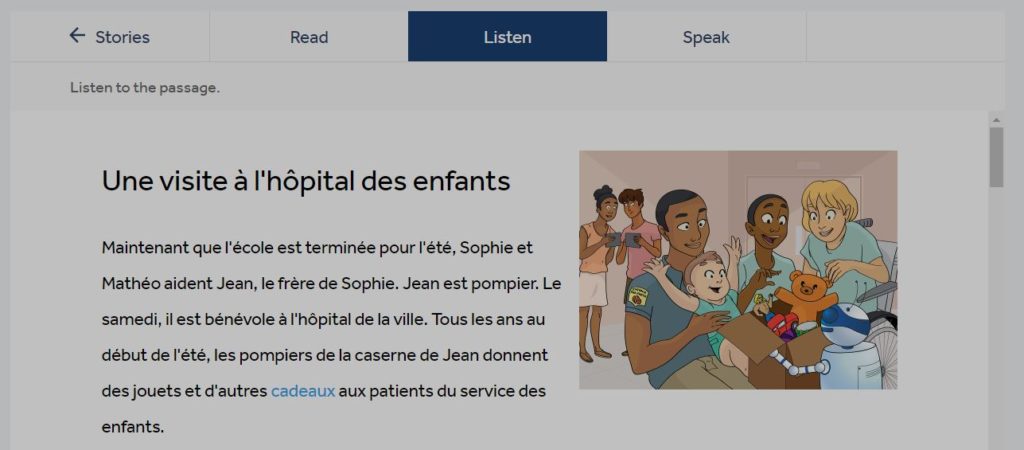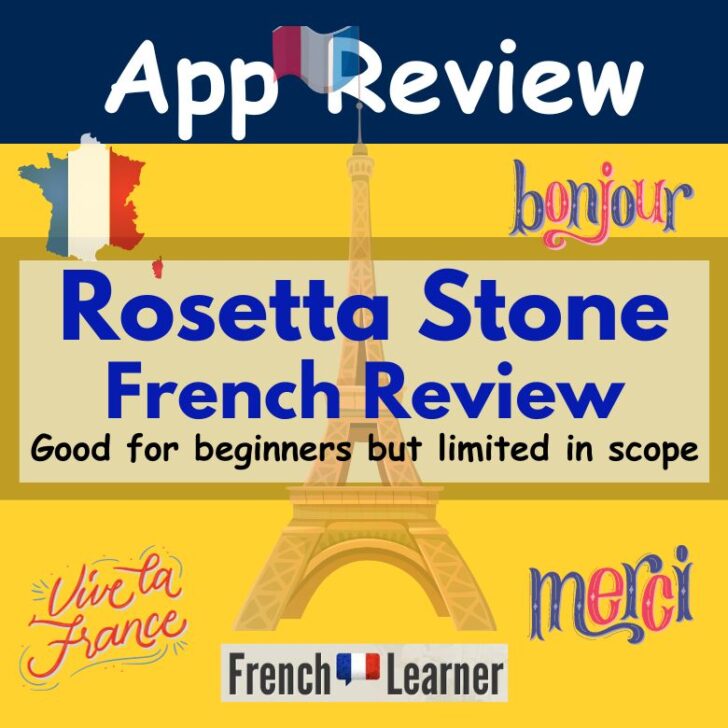Bonjour! My name is David and I’ve been teaching French online since 2014. The subject of Rosetta Stone has come up many times in my lessons over the years. I thought I’d review the app and share my findings. My conclusion is that while Rosetta Stone is good for somebody starting out in French, it does have some serious limitations. Keep reading to find out whether it’s for you or not.

Rosetta Stone French Review
I purchased the Rosetta Stone French course in order to figure out whether I’d recommend it to my students. My conclusion is yes, I’d recommend Rosetta Stone to my brand new and lower-beginners students.
While the company claims, “You’ll be seeing, hearing, reading and writing entirely in your new language”, I believe that this is true for just the scope of material presented in the course.
My conclusion is similar to other apps for learning French: it offers a decent introduction but not much more.
That said, it may be somewhat useful for visual learners as it uses flashcards. The TruAccent speech recognition feature could also be quite useful for pronunciation. The downside is that it’s very limited in scope of vocabulary and grammar.

Rosetta Stone review in a nutshell
Rosetta Stone works by showing the student images and accompanying audio. Your job is to learn to recognize what’s being said. The training method helps you learn to speak by having you speak back into your computer or phone’s microphone.
You are also taught listening comprehension by hearing audio and selecting the correct matching image. You’re taught grammar by seeing two options next to an image and having to select the right answer. The course’s 20 units cover a large range of subjects required for basic conversation.
Ultimately the question is, “Will I learn to speak French fluently with Rosetta Stone”? My honest answer is probably not. What the program does offer is the chance to gain mastery in pronunciation and listening comprehension.
That said, your speaking and listening comprehension will be limited to the material contained within the course. This is typical for any language learning product.
Leaning to speak a language fluently takes many years, lots of different kinds of approaches and not just using software alone.
All of that said, I feel strongly that Rosetta Stone French would be a great place to start for anybody looking to eventually speak French fluently.
Things I didn’t like
There were a few things that I didn’t like about this French course. First and foremost, they do a nice job presenting 20 logically laid out units.
But, I think it would have been very helpful if they provided a more detailed table of contents for each unit along with vocabulary lists and grammar explanations.
This would have been particularly useful for students with a bit of French under their belts not wanting to start at the very beginning.
How Much Does Rosetta Stone French Cost?
What’s great is that the program offers a free 3-day trial without having to submit a credit card number. When doing your 3-day trial you can sign up at any time. You cannot see the entire course plan during the 3-day trial.
You can choose from three plans: 1) Three months for $15.99/month, 2) 12 months for $10.50/month or 3) Lifetime for $199. For all of these packages Rosetta Stone offers a 30 Day money back guarantee.
Rosetta Stone’s Teaching Method
The Rosetta Stone approach is as follows: You listen to words and phrases with images. Then, you have to listen to audio and choose the matching image. In other instances the program makes you listen to a word or phrase and repeat it.
With the patented speech recognition engine called TrueAccent, the you get the chance to compare your accent with that of a native speaker and receive instant feedback.
As the lessons advance, new words and phrases are introduced. Your job is to listen to the audio and continue to pick the corresponding or matching images.
Another aspect is the testing of grammar whereby images are presented with written choices and you have to pick the right answer that matches the image.
Rosetta Stone French course overview
The Rosetta Stone French course has total 20 units with each unit containing four lessons. This makes for a total of 80 thirty-minute lessons.
The units cover a specific themes, such as Dining & Vacation or Professions & Hobbies (entire Units list included below).
The lessons offer sub-sections covering pronunciation, writing, vocabulary and grammar sections. A sub-section takes between 5-10 minutes to complete.

Taking a close look at Unit 4 on Shopping, for example, you’ll find that the lessons cover a wide variety of related vocabulary such as kinds of foods, clothing, materials and types of stores.
The lessons introduce lots of shopping-related verbs such as avoir besoin de (to need), aimex mieux (to prefer), payer (to pay), couter (to cost), chercher (to look for).
The lessons also cover a list of adjectives such as cher (expensive), bon marché (cheap), ouvert (opened) and fermé (closed).
The lessons are presented with a combination of the elements of Rosetta Stone’s teaching method: 1) Vocabulary recognition through matching pictures with audio; 2) Speaking back to test your pronunciation; and 3) Selecting the right grammatical answer.
My biggest complaint about the course presentation is that there’s no way to see what specific vocabulary and grammar each lesson covers. It would be very helpful if Rosetta Stone provided a detailed table of contents for each unit and lesson in the form of a PDF file.
This would be particularly useful for upper-beginners or lower-intermediates who don’t want to start at the very beginning of the course.
The following is the table of contents of the Rosetta Stone French Course:
- Unit 1 Langauge Basics
- Unit 2 Greetings & Introductions
- Unit 3 Work & School
- Unit 4 Shopping
- Unit 5 Travel
- Unit 6 Past & Future
- Unit 7 Friends & Social Life
- Unit 8 Dining & Vacation
- Unit 9 Home & Health
- Unit 10 Life & World
- Unit 11 Everyday Things
- Unit 12 Places & Events
- Unit 13 Tourism & Recreation
- Unit 14 Professions & Hobbies
- Unit 15 At Home & Around Town
- Unit 16 Style & Personal Wellness
- Unit 17 Buisness & Industry
- Unit 18 Arts & Academics
- Unit 19 Emergency Situations
- Unit 20 Family & Community
Coaching
Rosetta Stone offers both private and group live training sessions. It’s suggested to do the course material first then sign up for the lessons.
Live lessons run from 15-20 minutes and are taught by a Rosetta Stone coach who is always a native speaker. To learn more about private lessons please sign up for a free 3-day trial.

Story Reading – Great For Practicing Pronunciation!
I found that that Rosetta Stone’s “Stories” section is actually a wonderful resource for practicing speech and pronunciation.
You’ll find 20 units with lots of stories ranging from easy to advanced levels. Click on any story, then click on listen and play.
On the bottom-righ you’ll find a back-arrow icon. This allows you to go back ten seconds, hit pause and repeat what you’ve just heard.

Phrasebooks
Rosetta Stone offers several audio phrases books. The content taught within these phrasebooks could be considered ‘survival’ phrases for the beginner student taking a trip to a French-speaking country.
Topics covered include: Meeting People, Being Polite, Time & Money, Dining Out, Staying At A Hotel, Getting Around, Shopping and Health & Safety.
Audio Companion
At the bottom of the Explore All Content screen you’ll find an Audio Companion section. Here you can download Zip files containing MP3 files of the course units and lessons.
These Zip files could come in particularly handy for off-line study on either a computer or smartphone when the Internet is not available.
For each lesson you’ll find an MP3 files titled pronunciation, vocabulary, phrases, speaking and conversation.
While I find it very useful to have MP3 files files specifically dedicated to vocabulary, I feel that Rosetta Stone could have made the self-study experience better by providing accompanying printable PDF files.
French Alphabet
At the bottom of the Explore All content Screen you’ll find a French alphabet section. Here you can select any vowel or consonant and find lists of sample words with audio. This section is good for getting a quick overview of the alphabet.
But, I feel that Rosetta Stone could have done a much better job here in two areas: 1) Explaining the accents and how to use them; and 2) Teaching the complicated nasal sounds.
Rosetta Stone French Review – Conclusion
Et voilà ! I hope this review has helped you to decide whether Rosetta Stone is worth trying or not. The good news is that you can always give it a try and return it risk-free within 30 days if you don’t like it.

